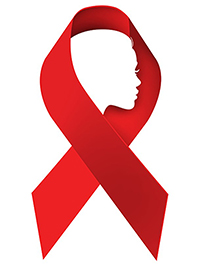HIV and Women: Centering Women’s Health Across HIV Research

Despite groundbreaking innovations across the HIV research continuum, women, girls, and gender-diverse people continue to be disproportionately impacted by the pandemic. According to UNAIDS, in 2022, more than half of people with HIV worldwide were women and girls.1 Research at the intersection of HIV and women’s health is a priority for the National Institutes of Health (NIH). The NIH Office of AIDS Research (OAR) and Office of Research Women’s Health (ORWH) catalyze these priorities through the HIV and Women Signature Program.
I'm proud to say that an intersectional, equity-informed, data-driven approach to research on HIV and women is the cornerstone of this program. OAR and ORWH, in collaboration with partners across NIH, recently reaffirmed our shared commitment to advancing science on HIV and women’s health by publishing a notice of information (NOI) and notice of special interest (NOSI) that highlight NIH’s interest in funding HIV-related grant applications that focus on the health needs of women, girls, and gender-diverse people across the lifespan.
The NOI (NOT-OD-24-117) outlines key research opportunities that were informed in part by community engagement and responses from a request for information that encouraged community groups and advocates, people with HIV, researchers, and partners across the federal government to share their perspectives on the most significant topics for research regarding HIV and women. In developing the NOI, we also considered analyses of current and past projects funded by NIH, which helped identify gaps and important areas for future research. A companion to the NOI, the NIH-wide NOSI (NOT-OD-24-119) highlights opportunities to accelerate this research through current notices of funding opportunities (NOFOs) and provides information about specific research priorities at participating NIH Institutes, Centers, and Offices (ICOs). The NOSI has broad support across NIH, with participation from 16 ICOs.
It has been gratifying to witness and support the increasing momentum since I joined OAR in December 2023. As part of the Signature Program, the NIH HIV and Women Working Group recently hosted a two-day virtual scientific workshop, Centering the Health of Women in HIV Research, to review the state of the science on HIV and women and inform the future research agenda. A global audience of more than 700 people joined the live-streamed workshop, which featured engaging presentations and generated robust discussion. The importance of community voices in research was evident throughout the workshop, with community members serving on the planning committee and presenting perspectives during each session.
OAR's commitment to supporting the next generation of researchers furthers our efforts to advance research on HIV and women. Several early career investigators (ECIs) presented their research at the March workshop, and the recent NOSI incorporates funding opportunities for career development and training. As I watch ECIs share their research and experiences, I am reminded of the enthusiasm I felt early in my career and am eager to channel that energy into my current role as the OAR Acting Director.
This is an exciting time for OAR and our NIH partners as momentum for HIV-related research focused on women, girls, and gender-diverse people continues to grow. These activities are taking place as initiatives across the federal government highlight the importance of research that is intentionally focused on the needs of women. A new White House Initiative on Women’s Health Research aims to “accelerate research that will provide the tools we need to prevent, diagnose, and treat conditions that affect women uniquely, disproportionately, or differently.” A corresponding Executive Order includes 20 new actions and commitments by federal agencies, including $200 million for research at NIH. The NOI and NOSI align with these objectives.
I see a similar momentum within the research community to prioritize efforts to advance women-centered HIV research across the lifespan. Now is the time to capitalize on this enthusiasm. The NOI and NOSI can catalyze this work by encouraging grant applications that focus on the health of women within HIV science across the research continuum. Together, we can leverage the tremendous success in HIV research to ensure that all women, girls, and gender-diverse people affected by HIV benefit from future innovations and scientific breakthroughs.
1 - UNAIDS. Global HIV & AIDS Statistics — Fact Sheet. Accessed May 3, 2024. www.unaids.org/en/resources/fact-sheet
This page last reviewed on December 10, 2024

